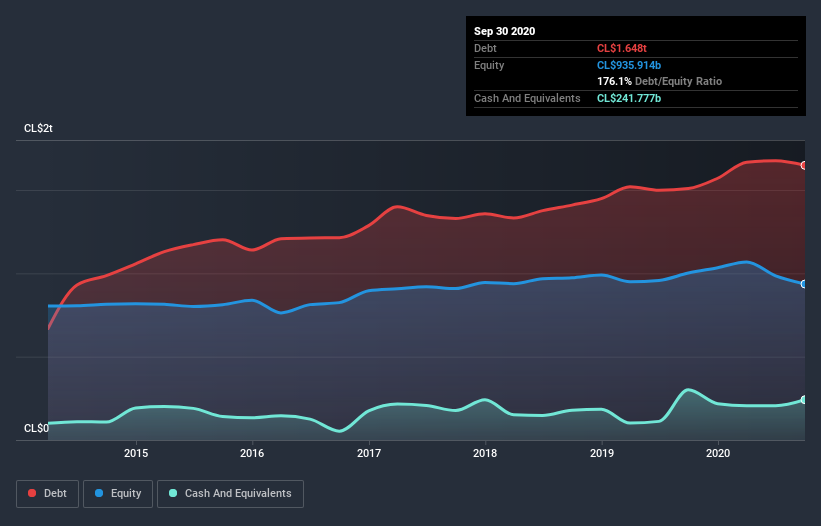- Chile
- /
- General Merchandise and Department Stores
- /
- SNSE:RIPLEY
Is Ripley (SNSE:RIPLEY) Using Debt In A Risky Way?

Legendary fund manager Li Lu (who Charlie Munger backed) once said, 'The biggest investment risk is not the volatility of prices, but whether you will suffer a permanent loss of capital.' It's only natural to consider a company's balance sheet when you examine how risky it is, since debt is often involved when a business collapses. We can see that Ripley Corp S.A. (SNSE:RIPLEY) does use debt in its business. But should shareholders be worried about its use of debt?
When Is Debt Dangerous?
Debt assists a business until the business has trouble paying it off, either with new capital or with free cash flow. If things get really bad, the lenders can take control of the business. However, a more usual (but still expensive) situation is where a company must dilute shareholders at a cheap share price simply to get debt under control. Of course, plenty of companies use debt to fund growth, without any negative consequences. The first step when considering a company's debt levels is to consider its cash and debt together.
View our latest analysis for Ripley
What Is Ripley's Debt?
You can click the graphic below for the historical numbers, but it shows that as of September 2020 Ripley had CL$1.65t of debt, an increase on CL$1.51t, over one year. However, it also had CL$241.8b in cash, and so its net debt is CL$1.41t.

How Healthy Is Ripley's Balance Sheet?
We can see from the most recent balance sheet that Ripley had liabilities of CL$1.49t falling due within a year, and liabilities of CL$1.12t due beyond that. On the other hand, it had cash of CL$241.8b and CL$570.1b worth of receivables due within a year. So its liabilities outweigh the sum of its cash and (near-term) receivables by CL$1.79t.
This deficit casts a shadow over the CL$449.2b company, like a colossus towering over mere mortals. So we'd watch its balance sheet closely, without a doubt. After all, Ripley would likely require a major re-capitalisation if it had to pay its creditors today. The balance sheet is clearly the area to focus on when you are analysing debt. But ultimately the future profitability of the business will decide if Ripley can strengthen its balance sheet over time. So if you want to see what the professionals think, you might find this free report on analyst profit forecasts to be interesting.
Over 12 months, Ripley made a loss at the EBIT level, and saw its revenue drop to CL$1.4t, which is a fall of 18%. That's not what we would hope to see.
Caveat Emptor
While Ripley's falling revenue is about as heartwarming as a wet blanket, arguably its earnings before interest and tax (EBIT) loss is even less appealing. Its EBIT loss was a whopping CL$75b. Combining this information with the significant liabilities we already touched on makes us very hesitant about this stock, to say the least. Of course, it may be able to improve its situation with a bit of luck and good execution. Nevertheless, we would not bet on it given that it lost CL$50b in just last twelve months, and it doesn't have much by way of liquid assets. So while it's not wise to assume the company will fail, we do think it's risky. The balance sheet is clearly the area to focus on when you are analysing debt. But ultimately, every company can contain risks that exist outside of the balance sheet. We've identified 2 warning signs with Ripley (at least 1 which shouldn't be ignored) , and understanding them should be part of your investment process.
Of course, if you're the type of investor who prefers buying stocks without the burden of debt, then don't hesitate to discover our exclusive list of net cash growth stocks, today.
When trading Ripley or any other investment, use the platform considered by many to be the Professional's Gateway to the Worlds Market, Interactive Brokers. You get the lowest-cost* trading on stocks, options, futures, forex, bonds and funds worldwide from a single integrated account. Promoted
New: AI Stock Screener & Alerts
Our new AI Stock Screener scans the market every day to uncover opportunities.
• Dividend Powerhouses (3%+ Yield)
• Undervalued Small Caps with Insider Buying
• High growth Tech and AI Companies
Or build your own from over 50 metrics.
This article by Simply Wall St is general in nature. It does not constitute a recommendation to buy or sell any stock, and does not take account of your objectives, or your financial situation. We aim to bring you long-term focused analysis driven by fundamental data. Note that our analysis may not factor in the latest price-sensitive company announcements or qualitative material. Simply Wall St has no position in any stocks mentioned.
*Interactive Brokers Rated Lowest Cost Broker by StockBrokers.com Annual Online Review 2020
Have feedback on this article? Concerned about the content? Get in touch with us directly. Alternatively, email editorial-team (at) simplywallst.com.
About SNSE:RIPLEY
Ripley
Engages in the retail sale of apparel, accessories, and home products through department stores and e-commerce in Chile and Peru.
Excellent balance sheet and fair value.
Market Insights
Community Narratives



